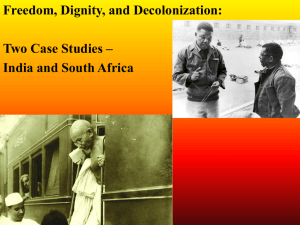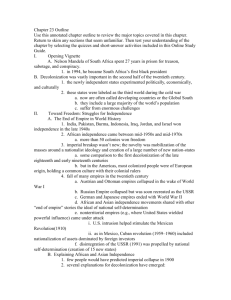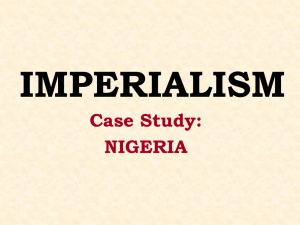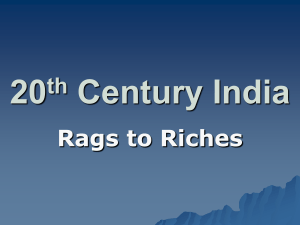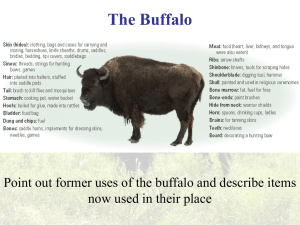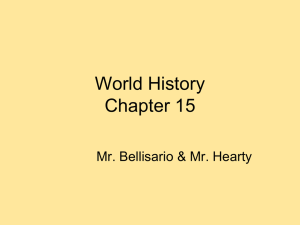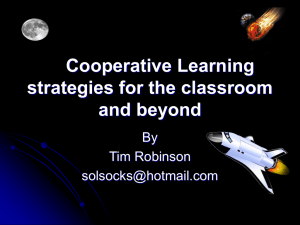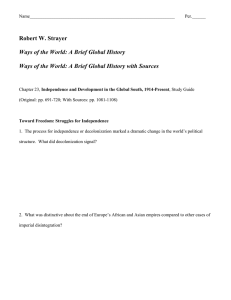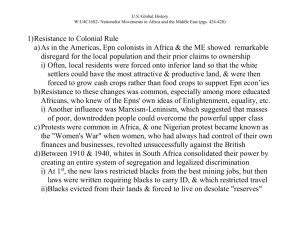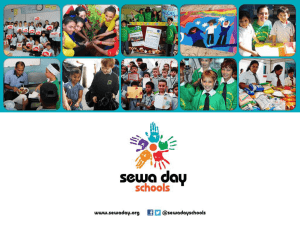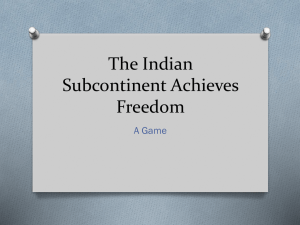Ch. 22 Reading Questions - Westerville City Schools
advertisement
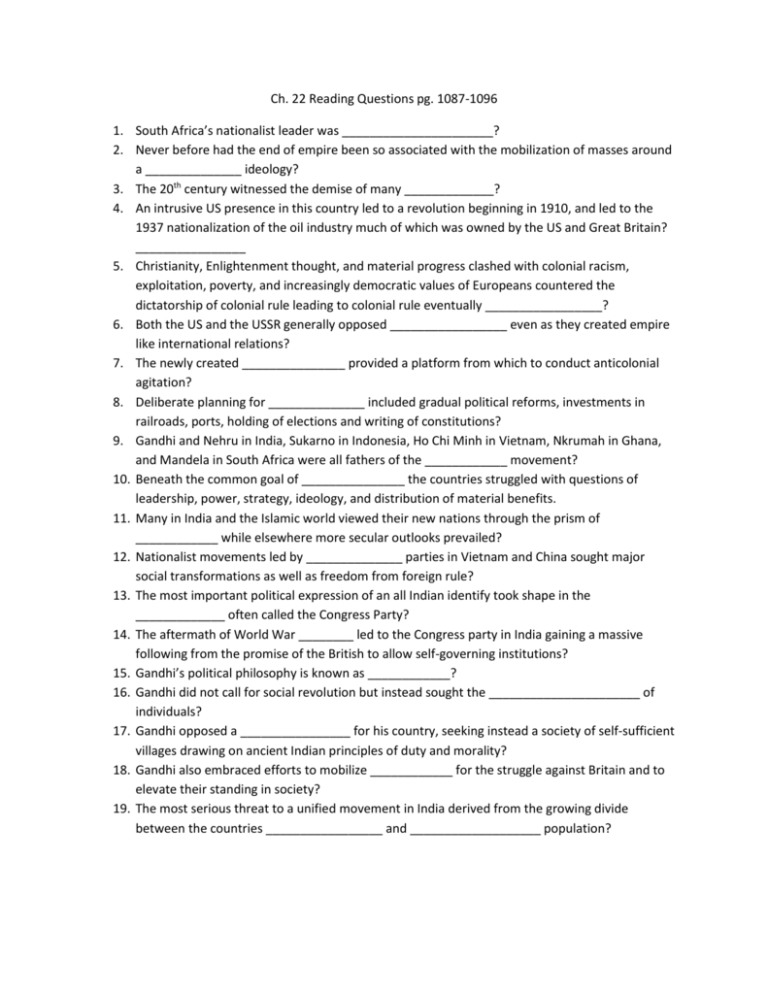
Ch. 22 Reading Questions pg. 1087-1096 1. South Africa’s nationalist leader was ______________________? 2. Never before had the end of empire been so associated with the mobilization of masses around a ______________ ideology? 3. The 20th century witnessed the demise of many _____________? 4. An intrusive US presence in this country led to a revolution beginning in 1910, and led to the 1937 nationalization of the oil industry much of which was owned by the US and Great Britain? ________________ 5. Christianity, Enlightenment thought, and material progress clashed with colonial racism, exploitation, poverty, and increasingly democratic values of Europeans countered the dictatorship of colonial rule leading to colonial rule eventually _________________? 6. Both the US and the USSR generally opposed _________________ even as they created empire like international relations? 7. The newly created _______________ provided a platform from which to conduct anticolonial agitation? 8. Deliberate planning for ______________ included gradual political reforms, investments in railroads, ports, holding of elections and writing of constitutions? 9. Gandhi and Nehru in India, Sukarno in Indonesia, Ho Chi Minh in Vietnam, Nkrumah in Ghana, and Mandela in South Africa were all fathers of the ____________ movement? 10. Beneath the common goal of _______________ the countries struggled with questions of leadership, power, strategy, ideology, and distribution of material benefits. 11. Many in India and the Islamic world viewed their new nations through the prism of ____________ while elsewhere more secular outlooks prevailed? 12. Nationalist movements led by ______________ parties in Vietnam and China sought major social transformations as well as freedom from foreign rule? 13. The most important political expression of an all Indian identify took shape in the _____________ often called the Congress Party? 14. The aftermath of World War ________ led to the Congress party in India gaining a massive following from the promise of the British to allow self-governing institutions? 15. Gandhi’s political philosophy is known as ____________? 16. Gandhi did not call for social revolution but instead sought the ______________________ of individuals? 17. Gandhi opposed a ________________ for his country, seeking instead a society of self-sufficient villages drawing on ancient Indian principles of duty and morality? 18. Gandhi also embraced efforts to mobilize ____________ for the struggle against Britain and to elevate their standing in society? 19. The most serious threat to a unified movement in India derived from the growing divide between the countries _________________ and ___________________ population? Reading Questions pg. 1097-1103 1. In 1947 Hindu _________________ and Muslim ________________ split into two separate countries? 2. Independence in South Africa was different as government control was given to ________________ settler majority’s, which represented less than 20 percent of the total population. 3. South Africa’s _______________ African majority had no political rights whatsoever within the central state. 4. The politically dominant section of the white community was known as the ____________? 5. Despite continued hostility between white South Africans of British and Afrikaner background, both felt their way of life was jeopardized by a move towards __________________ majority rule? 6. Unlike agrarian India, South Africa had developed a ______________________ economy based on gold and diamond mining. 7. Almost all _____________________ were involved in this complex modern economy providing labor for white owned farms? 8. South Africa had an overwhelming prominence of race in the official policy of ________________, which attempted to separate blacks from whites in every way? 9. Rigid “_________________” monitored and tried to control the movement of Africans into cities, where they were subject to extreme social segregation? 10. Established in 1912 the ______________________________ , like its Indian predecessor, was led by male, educated, professional, and middle class Africans? 11. For four decades the leaders practiced _______________ and moderate protest? 12. _______________ were denied full membership until 1943 in the ANC? 13. During the 1950’s the ANC leadership which now included, ___________________ broadened its base of support and launched nonviolent civil disobedience? 14. The government of South Africa responded with tremendous repression and the freedoms struggles. The major political parties were now ________________? 15. Active oppression within South Africa was now primarily expressed by student groups part of the ____________________ movement? 16. In 1976 an explosion of protest in _____________________ was initially triggered by the government’s decision to enforce education for Africans in the language of white Afrikaners rather than English? 17. The release of Nelson Mandela from prison, legalization of the ANC, and negotiations led to the abandonment of the long holding policies of ________________? Ch. 22 Reading Questions pg. 1103-1112 1. Africa’s first modern nationalist hero was _______________________ from Ghana? 2. Nations in Africa with Thailand, Ethiopia, Iran, Central and South America all formed the bloc of nations known as ________________________? 3. Many developing countries were culturally very _____________ with little loyalty to the central state? 4. As colonial rule grew to a close, European authorities in many places attempted to transplant ______________________ institutions to colonies they had long governed? 5. In the country of _________________ independence was a long struggle providing time for the political leadership to sort its self out after being handed over gradually by Great Britain, and was led by Gandhi and Nehru? 6. Gandhi and Nehru were committed to ___________________ practice which some argued allowed elites from Indian society to find a place in politics? 7. In the new states of Africa few retained their ____________________ institutions beyond the initial post independence decades? 8. Many of the popular political parties that led the struggle for independence loss mass support and were swept away by ___________________________? 9. Africans suggested that their ______________________ cultures based on communal rather than individualistic values concerned to achieve consensus rather than majority rule was not compatible with party politics? 10. The _______________ disappointments of independence also contributed to the erosion of support for democracy? 11. Economic disappointments, class resentments, and ethnic conflict provided the context for numerous _________________ takeovers? 12. Military rule also swept over Latin America in the 1960’s-70s where armed forces had long intervened in ___________________ life? 13. Latin American states lived in the shadows of a dominant ___________________? 14. The Cuban Revolution of 1959 brought _________________ to power bringing Communism into the country? 15. Salvador Allende from _________________ brought his Popular United Party to power and brought together the socialist and communists in the country? 16. Internal _______________ mounted from the bureaucracy, military officers, church, wealthy business, and landlord elites including even the US who were training military forces throughout Latin America. 17. By 2000 almost all Latin American countries had abandoned military rule and returned to _________________ governments because of the failures of restarting disastrous economic conditions? 18. In the new independent nations most people expected the _____________ authorities to take responsibility in restarting the economy? 19. State owned companies buy and sell shares on the stock market seeking profits in an economic system that’s been called “___________________________”? 20. In East Asia instead of focusing on industrial production for domestic consumption they chose to specialize in ___________________ products for an export market? Ch. 22 Reading Questions 1112-118 1. After World War I Turkey emerged from the _______________ Empire as a new nation led by Mustafa Ataturk? 2. Ataturk wanted to modernize the country and remove the _____________ from public life? 3. _______________ Culture, schools, courts, law codes, organizations and sacred tombs were all destroyed or abandoned? 4. The most visible change of Ataturk’s revolutionary program occurred in the realm of ________________? 5. ____________ were granted equal rights, inheritance, and child custody, and in 1934 received the right to vote in Turkey? 6. Shah Mohammad Reza Pahlavi led _____________ through a largely successful modernization movement? 7. Shah’s _____________ Revolution had redistributed land to many of Iran’s peasants, and granted women the right to vote? 8. Opposition to Shah came from the Shi’ite’s religious leaders and moved towards the Islamization of ________________ life? 9. The new government defined itself as an Islamic _______________ with an elected Parliament and a constitution but in practice conservative Islamic elites exercised dominant power? 10. Khomeini, the new leader, believed the purpose of government was to apply the law of ____________? 11. In June 1980 textbooks, curricula, and faculty were purified to teach only ______________ influences? 12. Women were required to wear hijab, sexual segregation was imposed, legal age of marriage was lowered to nine, married women could no longer file divorce, yet despite these restrictions many women _______________ the revolution? 13. In Iran the country’s ____________ revenues continue to fund its development? Answers Ch. 22 Reading Questions pg. 1087-1096 1. 2. 3. 4. 5. 6. 7. 8. 9. 10. 11. 12. 13. 14. 15. 16. 17. 18. 19. Nelson Mandela Nationalist Empires Mexico Disappearing 6. Old European Colonial Empires United Nations Decolonization Independence Independence Religion Communist Indian National Congress (INC) WWI Satyagraha Moral Transformation Modern Industrial Future Women Hindu and Muslim Ch. 22 Reading Questions 1096-1102 1. 2. 3. 4. 5. 6. 7. 8. 9. 10. 11. 12. 13. 14. 15. 16. 17. India and Pakistan White Black Boers or Afrikaners Black African Mature Industrial Black Africans Apartheid Pass Laws African National Congress (ANC) Peaceful Women Mandela Illegal Black Consciousness Johannesburg Apartheid Ch. 22 Reading Questions 1103-1112 1. 2. 3. 4. 5. 6. 7. 8. 9. 10. 11. 12. 13. 14. 15. 16. 17. 18. 19. 20. Kwame Nkrumah Third World Countries, Developing Countries, or Global South Diverse Democratic India Democratic Democratic Military Coups Traditional Economic Military Political US Fidel Castro Chile Opposition Democratic State State Capitalism Particular Ch. 22 Reading Questions 1112-1118 1. 2. 3. 4. 5. 6. 7. 8. 9. 10. 11. 12. 13. Ottoman Islam’s Islamic Dress Women Iran White Public Republic Allah Islamic Supported Oil
